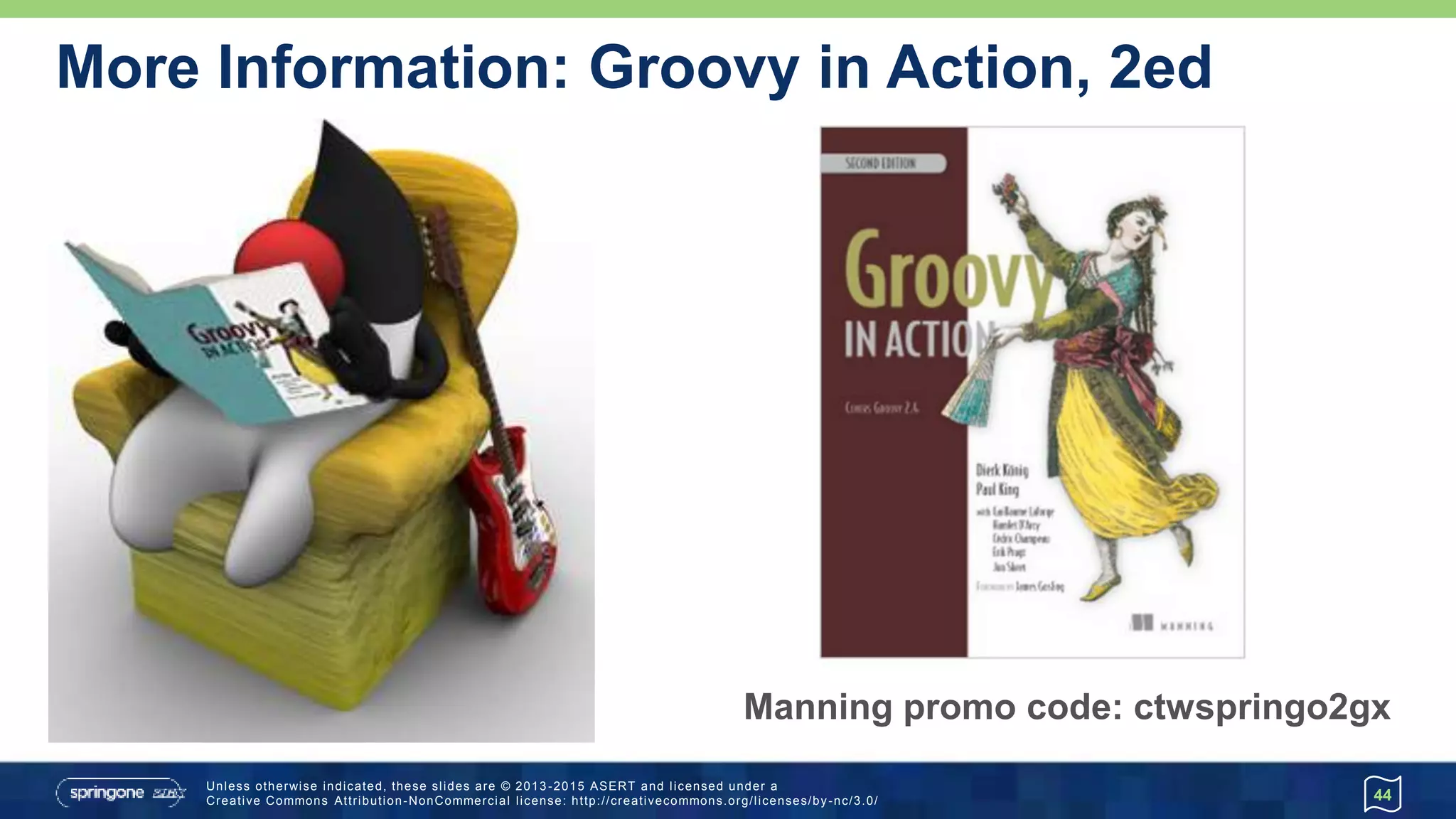Working with Databases and Groovy
This document discusses how to work with databases using Groovy. It covers:
- Connecting to databases and using groovy.sql.Sql to execute queries and statements
- Performing reads and writes like inserting, updating, deleting rows
- Calling stored procedures
- Advanced techniques like transactions, batching, pagination
- Using groovy.sql.DataSet to treat tables as collections
It also briefly introduces using MongoDB and Neo4j with Groovy.

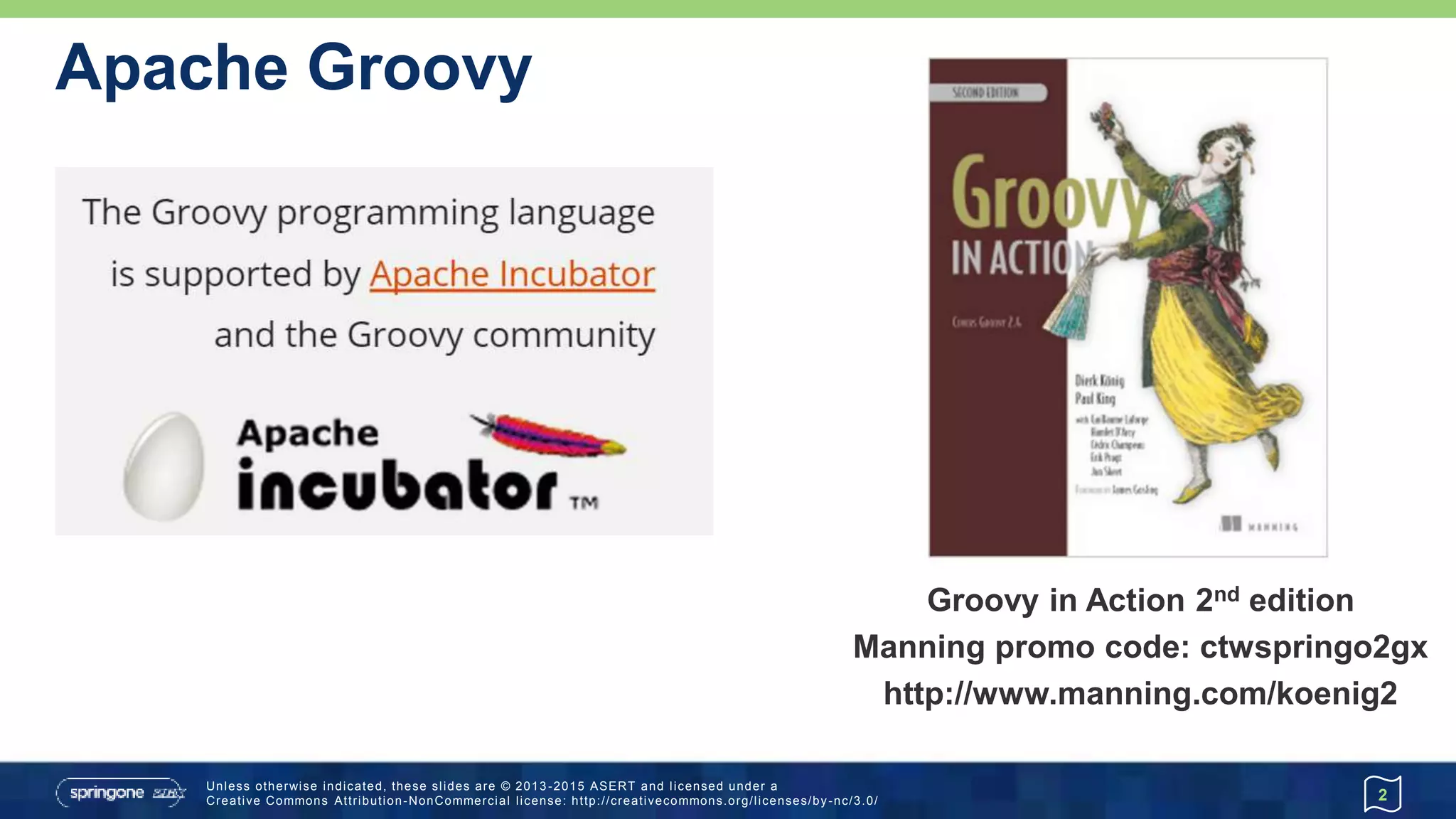
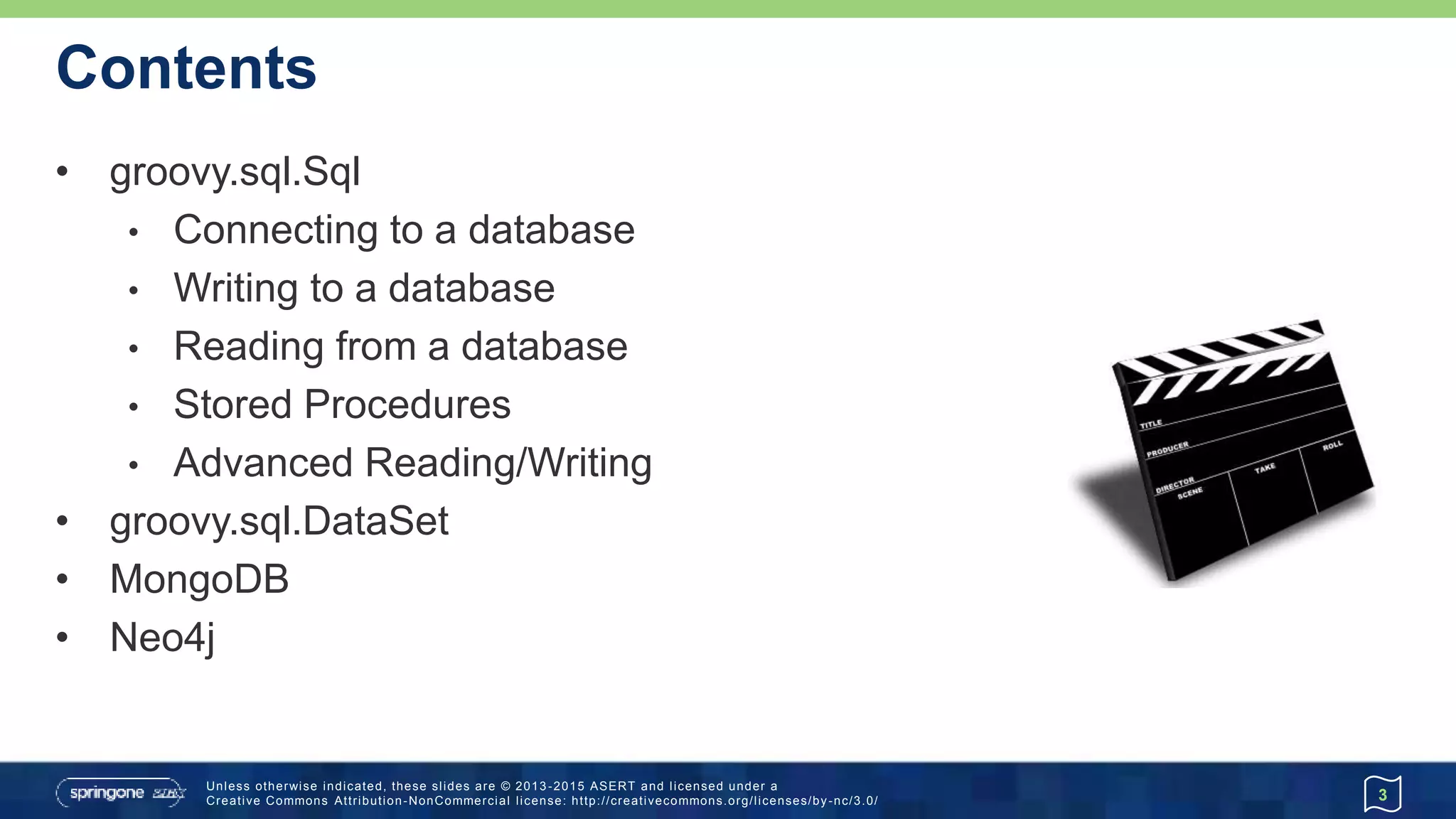
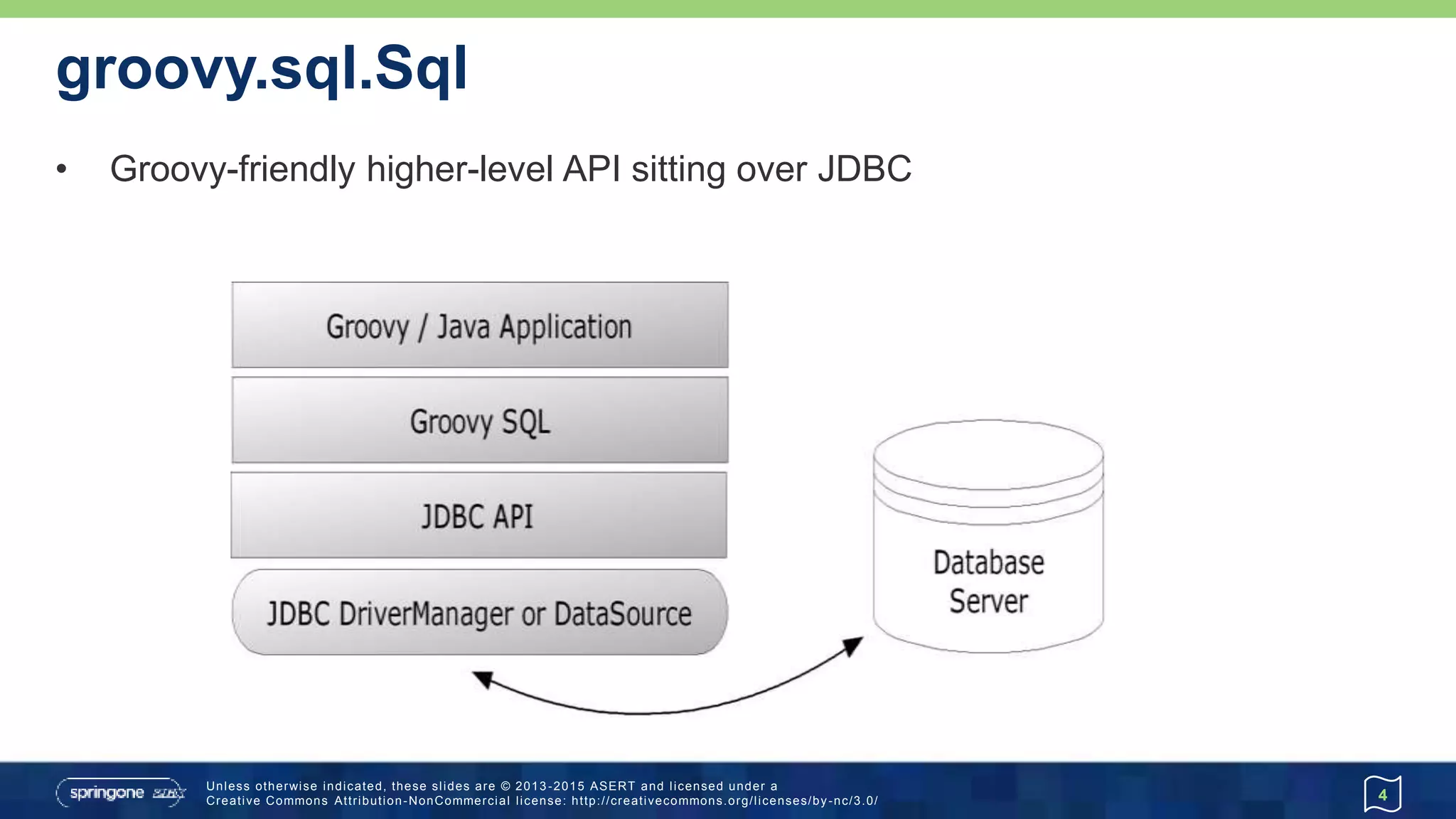
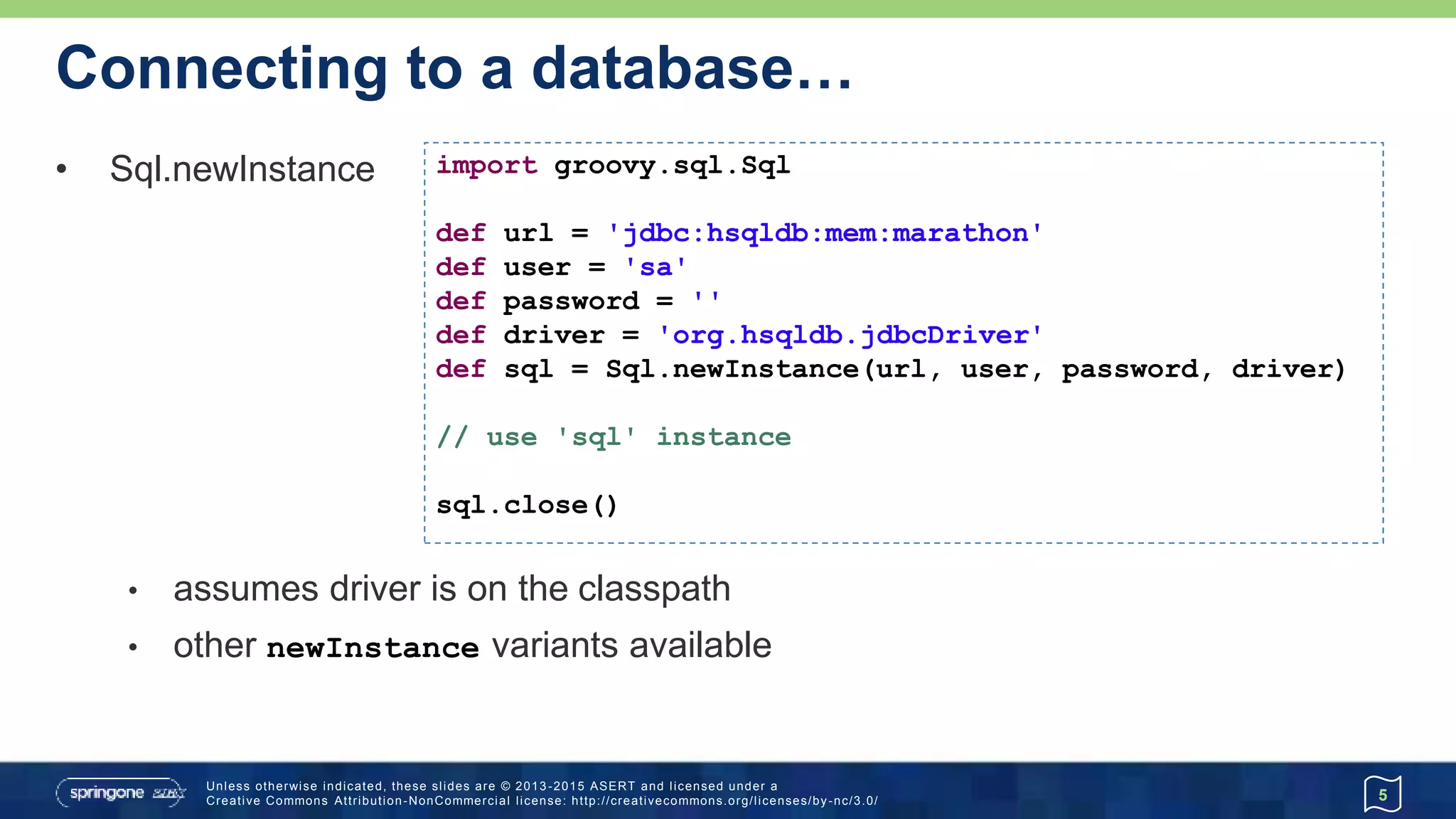
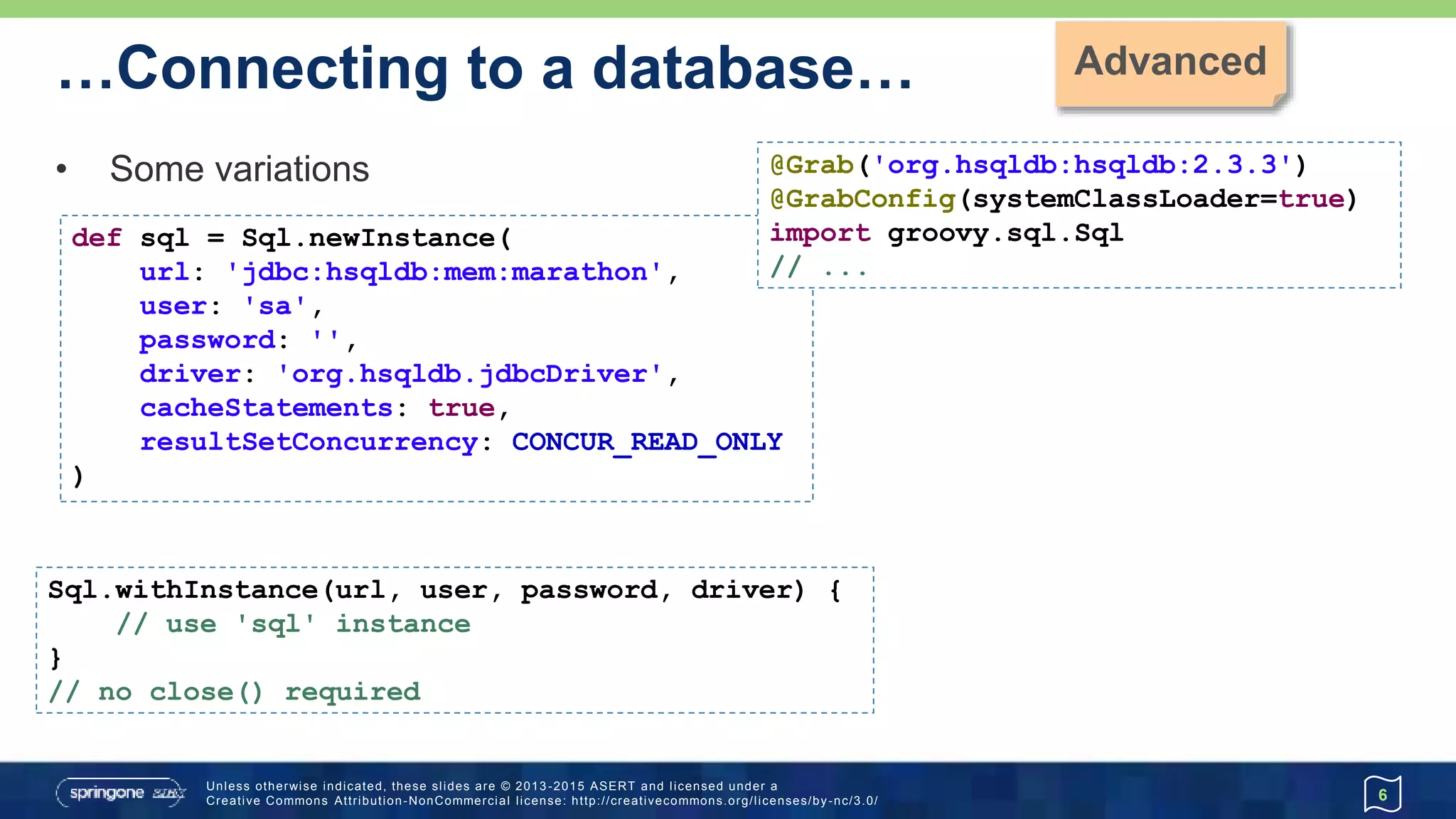
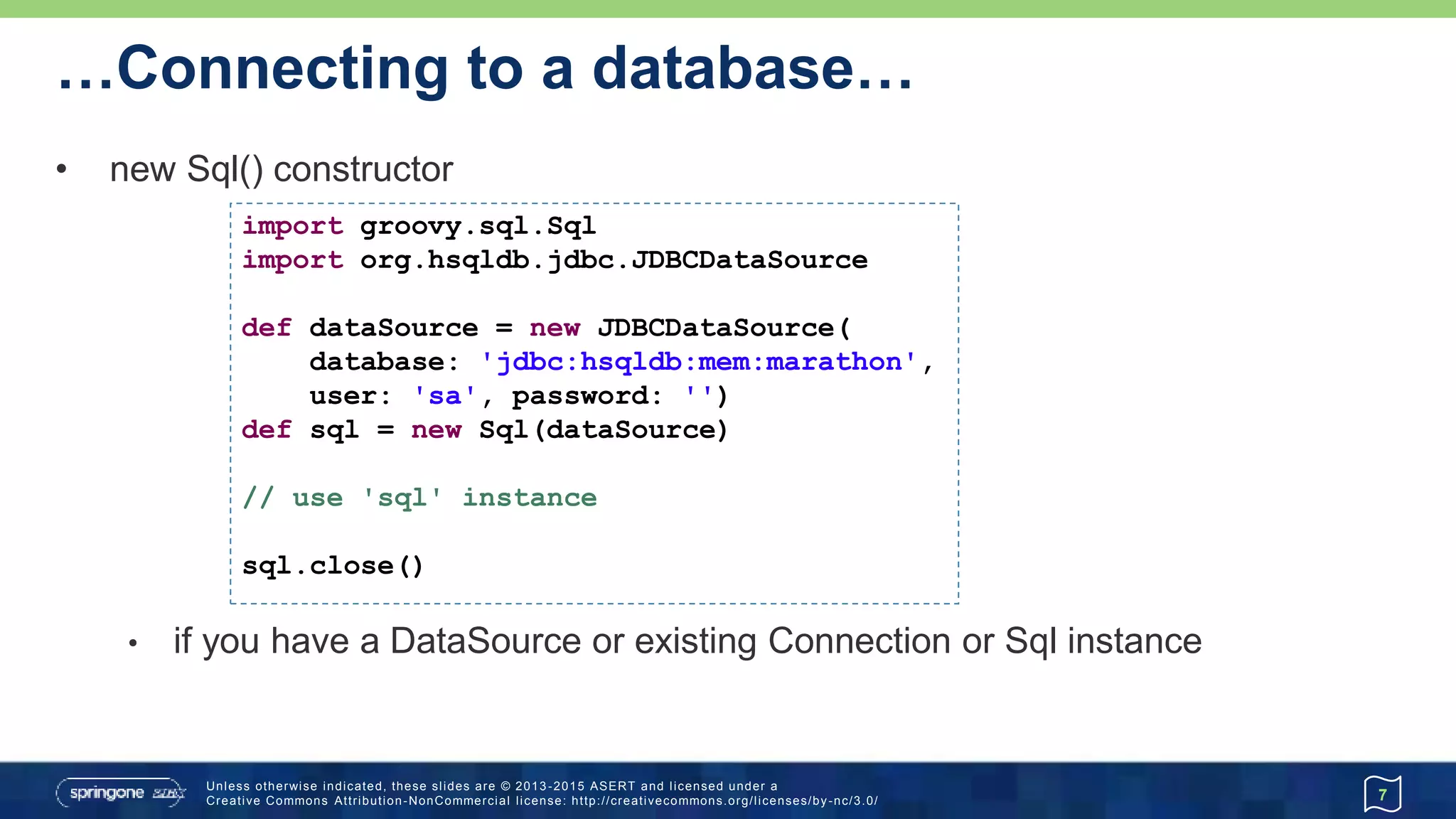
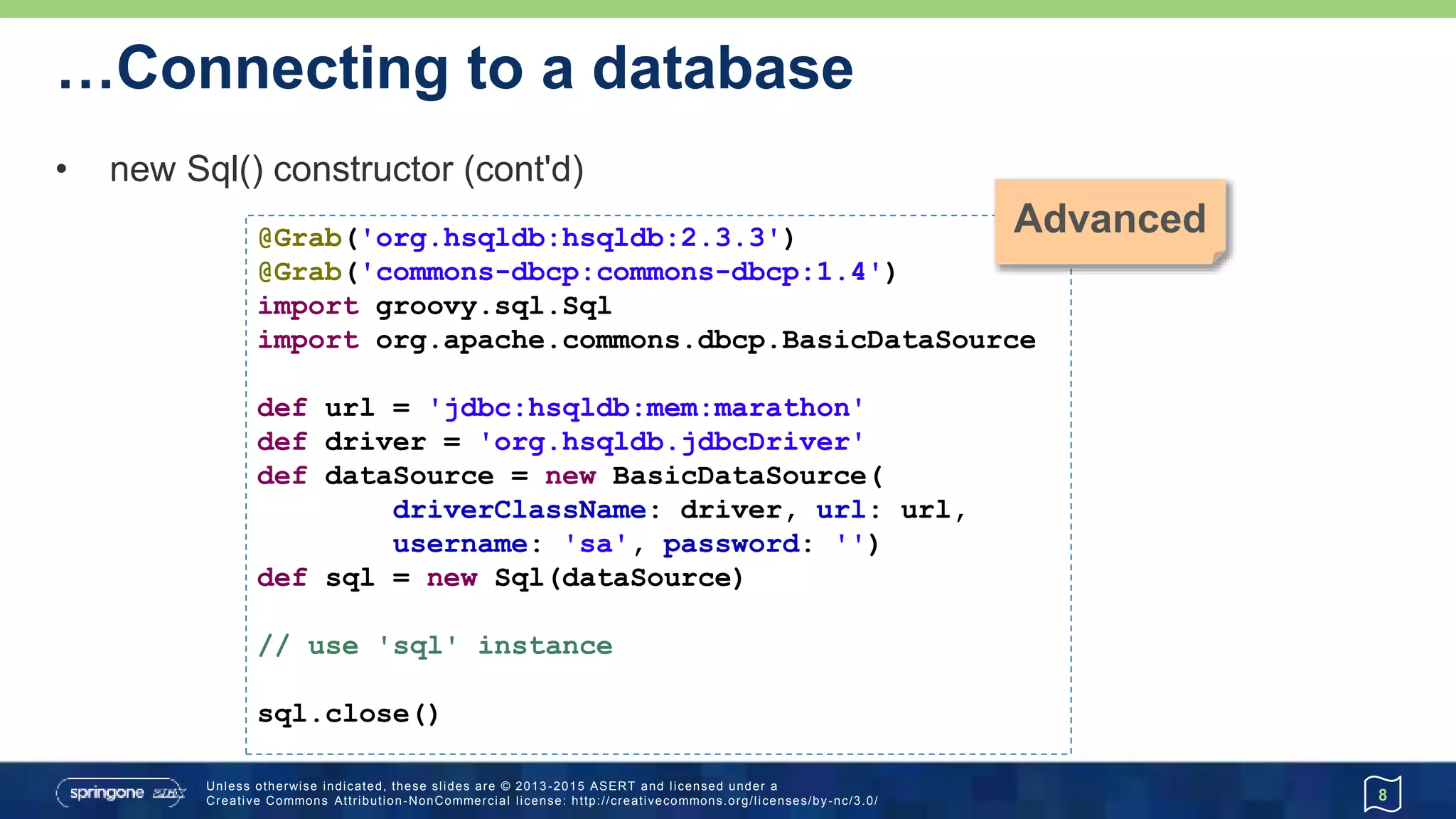
![…Writing to a database
9
def data = [first: 'Khalid', last: 'Khannouchi', birth: '1971-12-22']
sql.execute """
INSERT INTO Athlete (firstname, lastname, dateOfBirth)
VALUES (${data.first},${data.last},${data.birth})
"""
String athleteInsert = 'INSERT INTO Athlete (firstname, lastname) VALUES (?,?)'
def keys = sql.executeInsert athleteInsert, ['Ronaldo', 'da Costa']
assert keys[0] == [2]
def rowsUpdated = sql.executeUpdate '''
UPDATE Athlete SET dateOfBirth='1970-06-07' where lastname='da Costa'
'''
assert rowsUpdated == 1
sql.execute "delete from Athlete where lastname = 'Tergat'"
Advanced](https://image.slidesharecdn.com/groovydatabasespaulkingsep2014-140909144452-phpapp02/75/groovy-databases-9-2048.jpg)
![Reading from a database…
10
sql.query('SELECT firstname, lastname FROM Athlete') { resultSet ->
while (resultSet.next()) {
print resultSet.getString(1)
print ' '
println resultSet.getString('lastname')
}
}
sql.eachRow('SELECT firstname, lastname FROM Athlete') { row ->
println row[0] + ' ' + row.lastname
}](https://image.slidesharecdn.com/groovydatabasespaulkingsep2014-140909144452-phpapp02/75/groovy-databases-10-2048.jpg)
![…Reading from a database
11
def first = sql.firstRow('SELECT lastname, dateOfBirth FROM Athlete')
def firstString = first.toMapString().toLowerCase()
assert firstString == '[lastname:tergat, dateofbirth:1969-06-17]'
List athletes = sql.rows('SELECT firstname, lastname FROM Athlete')
println "There are ${athletes.size()} Athletes:"
println athletes.collect { "$it.FIRSTNAME ${it[-1]}" }.join(", ")
assert sql.firstRow('SELECT COUNT(*) as num FROM Athlete').num == 3](https://image.slidesharecdn.com/groovydatabasespaulkingsep2014-140909144452-phpapp02/75/groovy-databases-11-2048.jpg)
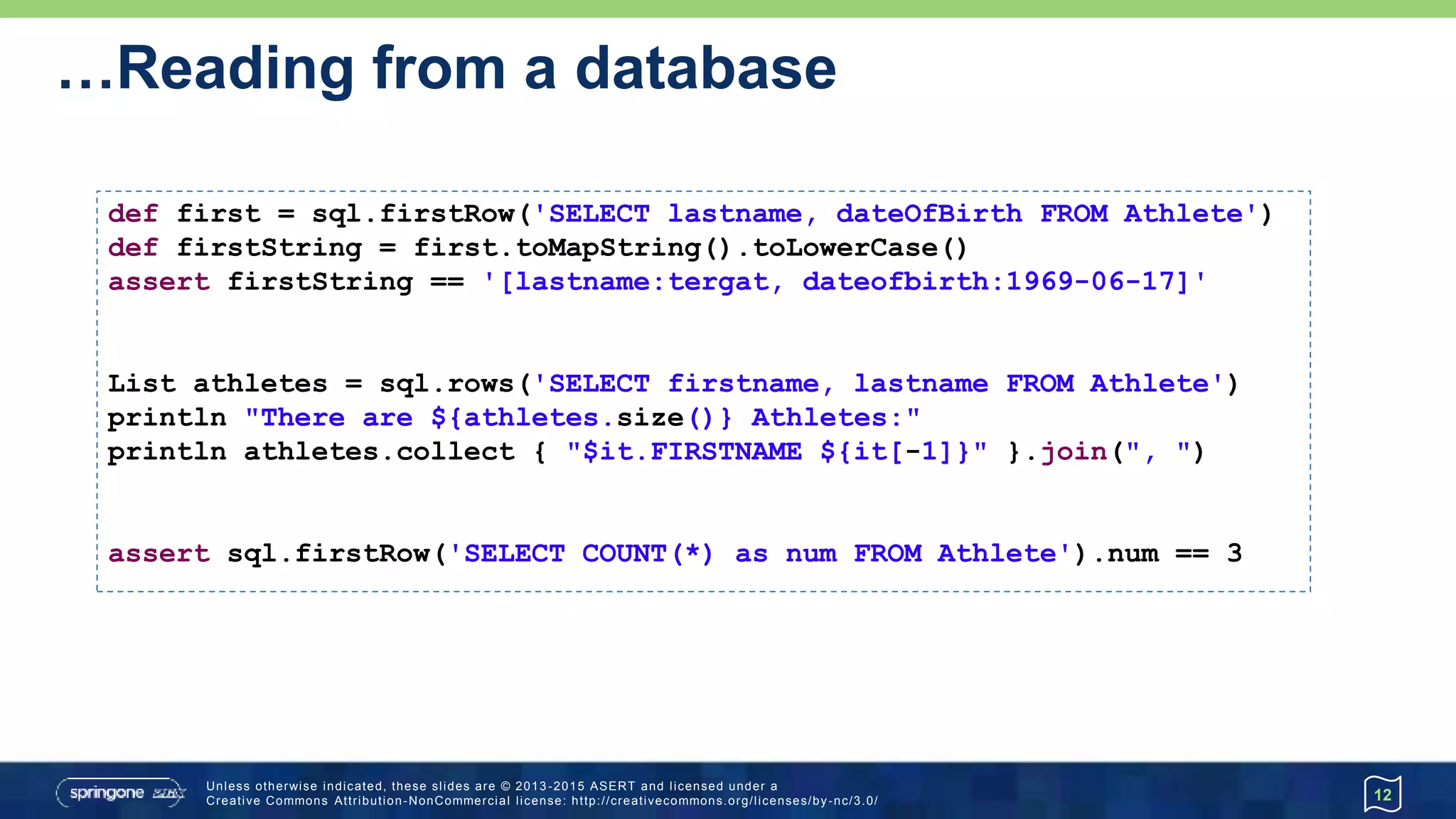
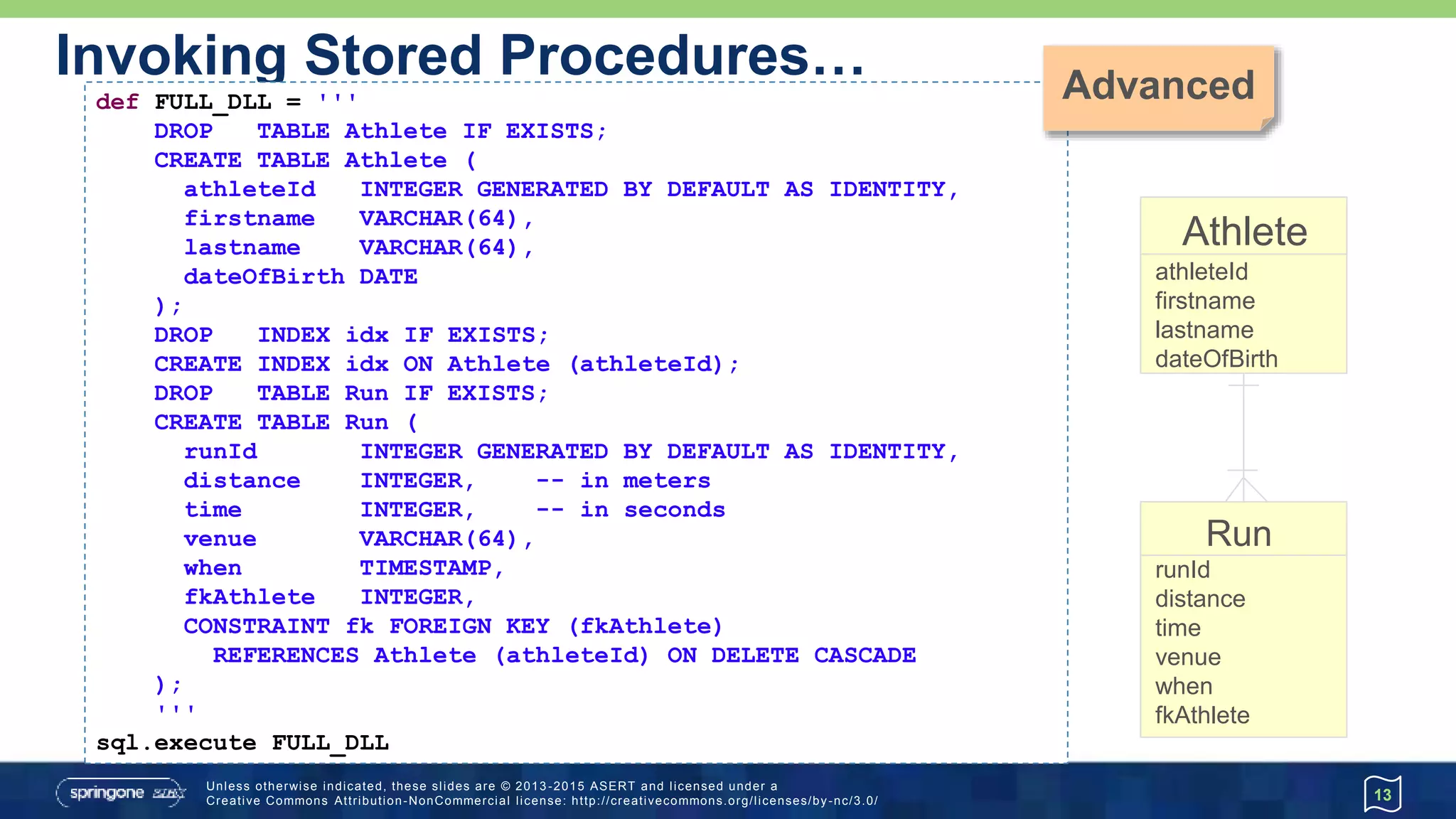
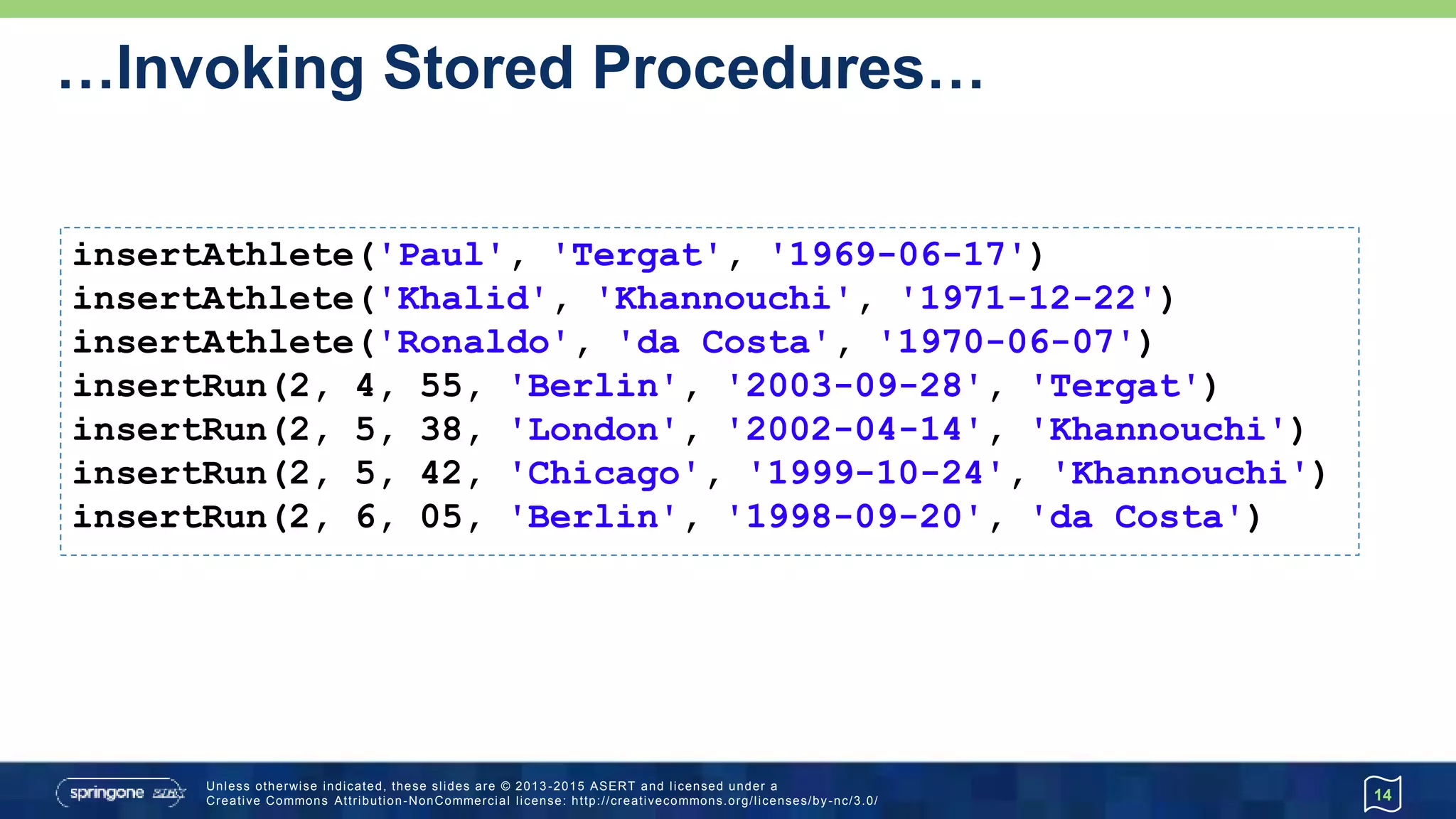
![…Invoking Stored Procedures…
15
db.execute '''
CREATE FUNCTION FULL_NAME (p_lastname VARCHAR(64))
RETURNS VARCHAR(100)
READS SQL DATA
BEGIN ATOMIC
declare ans VARCHAR(100);
SELECT CONCAT(firstname, ' ', lastname) INTO ans
FROM Athlete WHERE lastname = p_lastname;
return ans;
END
'''
assert db.firstRow("{? = call FULL_NAME(?)}", ['Tergat'])[0] == 'Paul Tergat'](https://image.slidesharecdn.com/groovydatabasespaulkingsep2014-140909144452-phpapp02/75/groovy-databases-15-2048.jpg)
![…Invoking Stored Procedures
16
db.execute '''
CREATE PROCEDURE CONCAT_NAME (OUT fullname VARCHAR(100),
IN first VARCHAR(50), IN last VARCHAR(50))
BEGIN ATOMIC
SET fullname = CONCAT(first, ' ', last);
END
'''
db.call("{call CONCAT_NAME(?, ?, ?)}", [Sql.VARCHAR, 'Paul', 'Tergat']) {
fullname -> assert fullname == 'Paul Tergat'
}](https://image.slidesharecdn.com/groovydatabasespaulkingsep2014-140909144452-phpapp02/75/groovy-databases-16-2048.jpg)
![Advanced Reading…
• Rowset metadata
17
def dump(sql, tablename) {
println " CONTENT OF TABLE ${tablename} ".center(40, '-')
sql.eachRow('SELECT * FROM ' + tablename) { rs ->
def meta = rs.getMetaData()
if (meta.columnCount <= 0) return
for (i in 0..<meta.columnCount) {
print "${i}: ${meta.getColumnLabel(i + 1)}".padRight(20) // counts from 1
print rs[i]?.toString() // counts from 0
print "n"
}
println '-' * 40
}
}](https://image.slidesharecdn.com/groovydatabasespaulkingsep2014-140909144452-phpapp02/75/groovy-databases-17-2048.jpg)
![…Advanced Reading…
18
def dump(sql, tablename) {
println " CONTENT OF TABLE ${tablename} ".center(40, '-')
sql.eachRow('SELECT * FROM ' + tablename) { rs ->
def meta = rs.getMetaData()
if (meta.columnCount <= 0) return
for (i in 0..<meta.columnCount) {
print "${i}: ${meta.getColumnLabel(i + 1)}".padRight(20) // counts from 1
print rs[i]?.toString() // counts from 0
print "n"
}
println '-' * 40
}
} ----------------------- CONTENT OF TABLE Athlete -----------------------
ATHLETEID FIRSTNAME LASTNAME DATEOFBIRTH
------------------------------------------------------------------------
1 Paul Tergat 1969-06-17
2 Khalid Khannouchi 1971-12-22
3 Ronaldo da Costa 1970-06-07](https://image.slidesharecdn.com/groovydatabasespaulkingsep2014-140909144452-phpapp02/75/groovy-databases-18-2048.jpg)
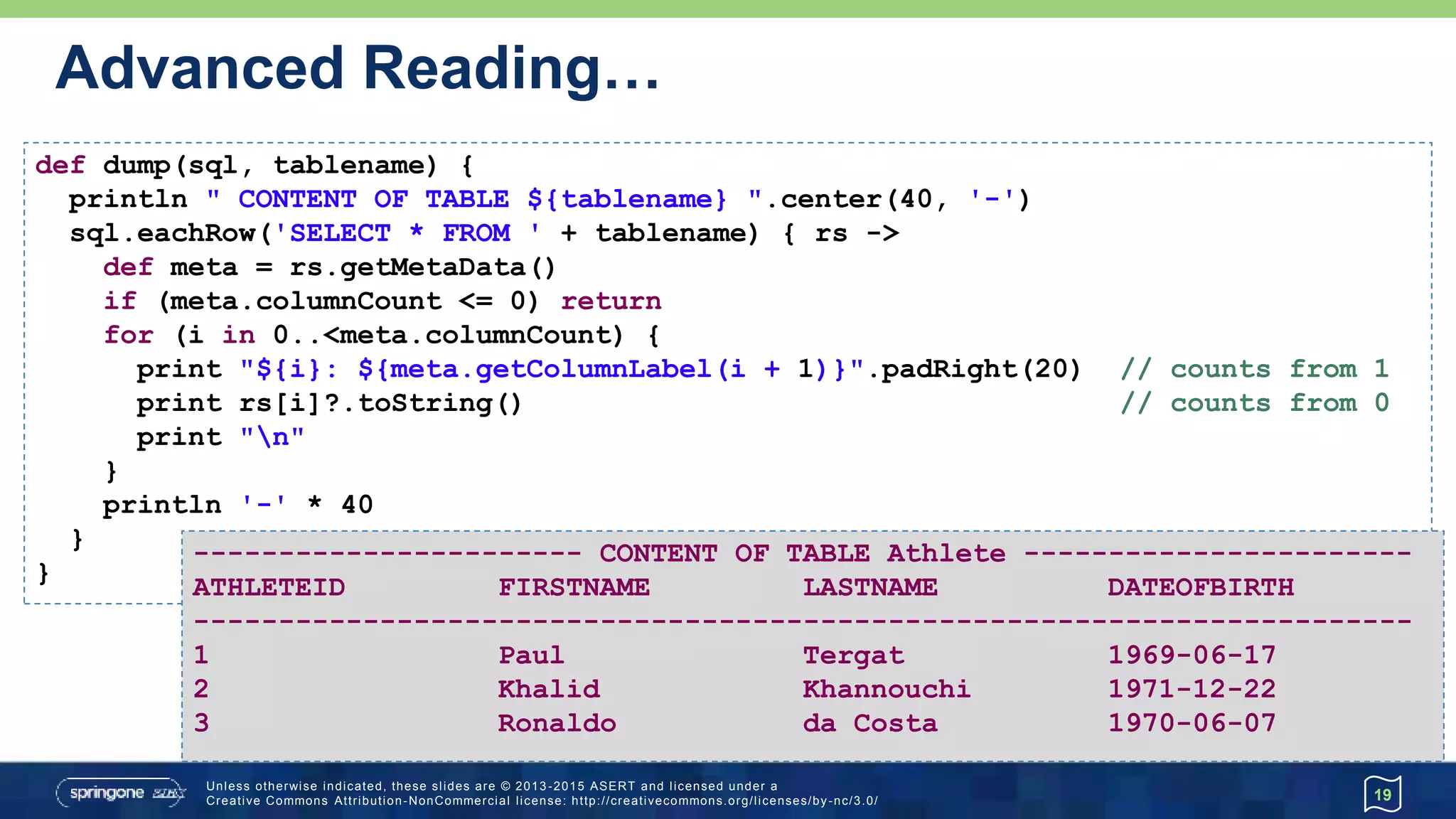
![…Advanced Reading
• Pagination
20
qry = 'SELECT * FROM Athlete'
assert sql.rows(qry, 1, 4)*.lastname ==
['Tergat', 'Khannouchi', 'da Costa', 'Gebrselassie']
assert sql.rows(qry, 5, 4)*.lastname ==
['Makau', 'Radcliffe', 'Ndereba', 'Takahashi']
assert sql.rows(qry, 9, 4)*.lastname ==
['Loroupe', 'Kristiansen']](https://image.slidesharecdn.com/groovydatabasespaulkingsep2014-140909144452-phpapp02/75/groovy-databases-20-2048.jpg)
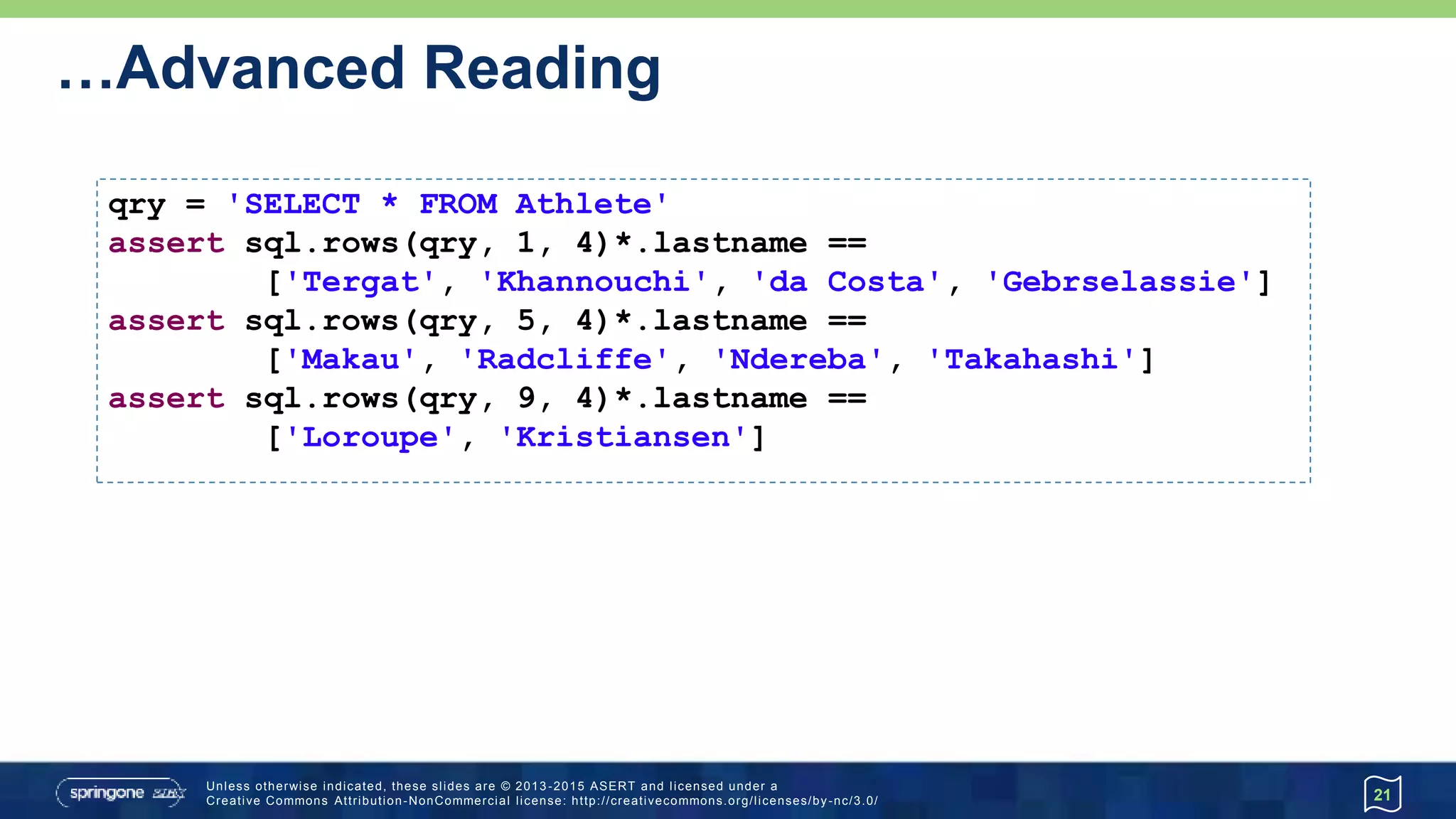
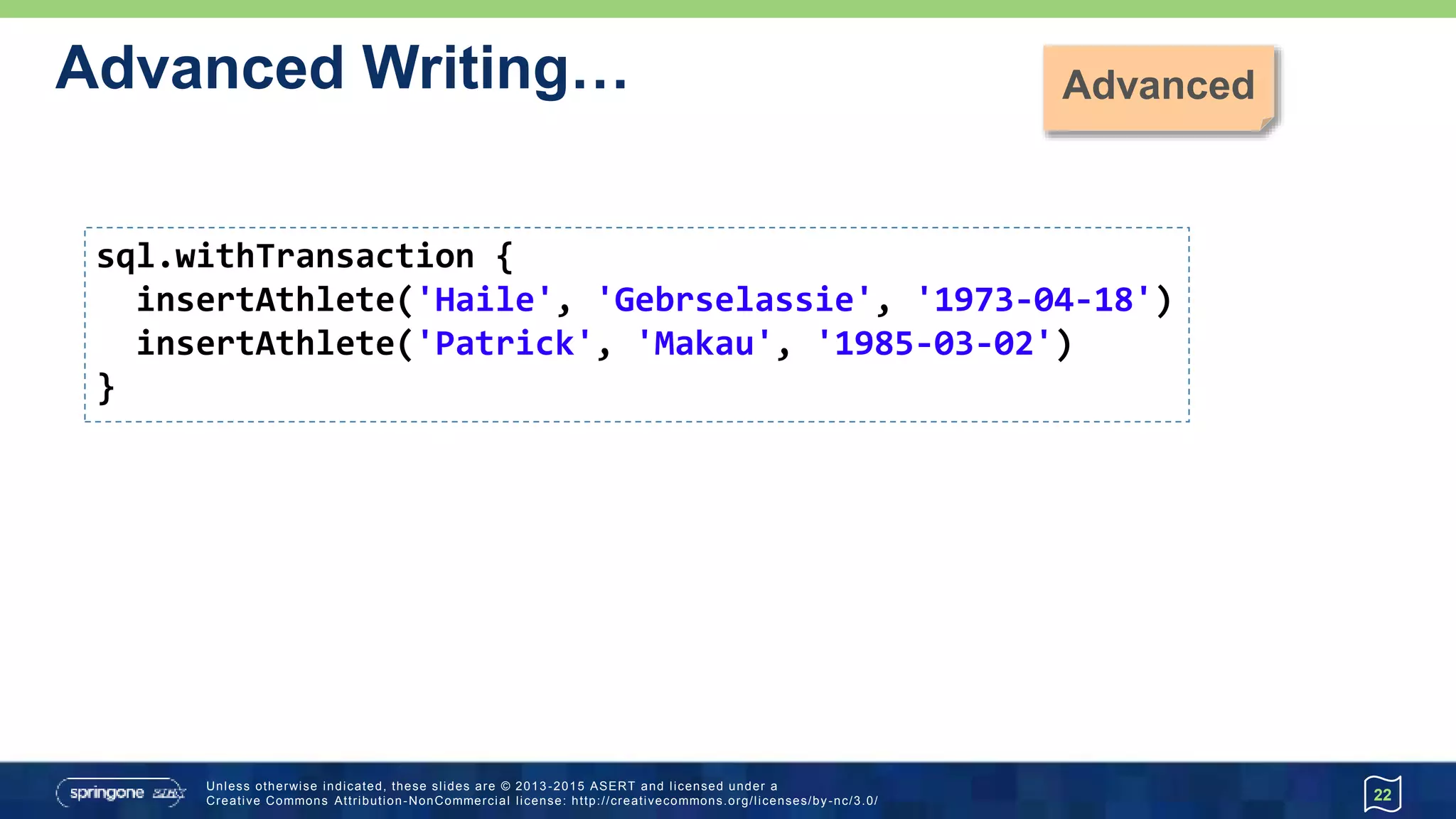
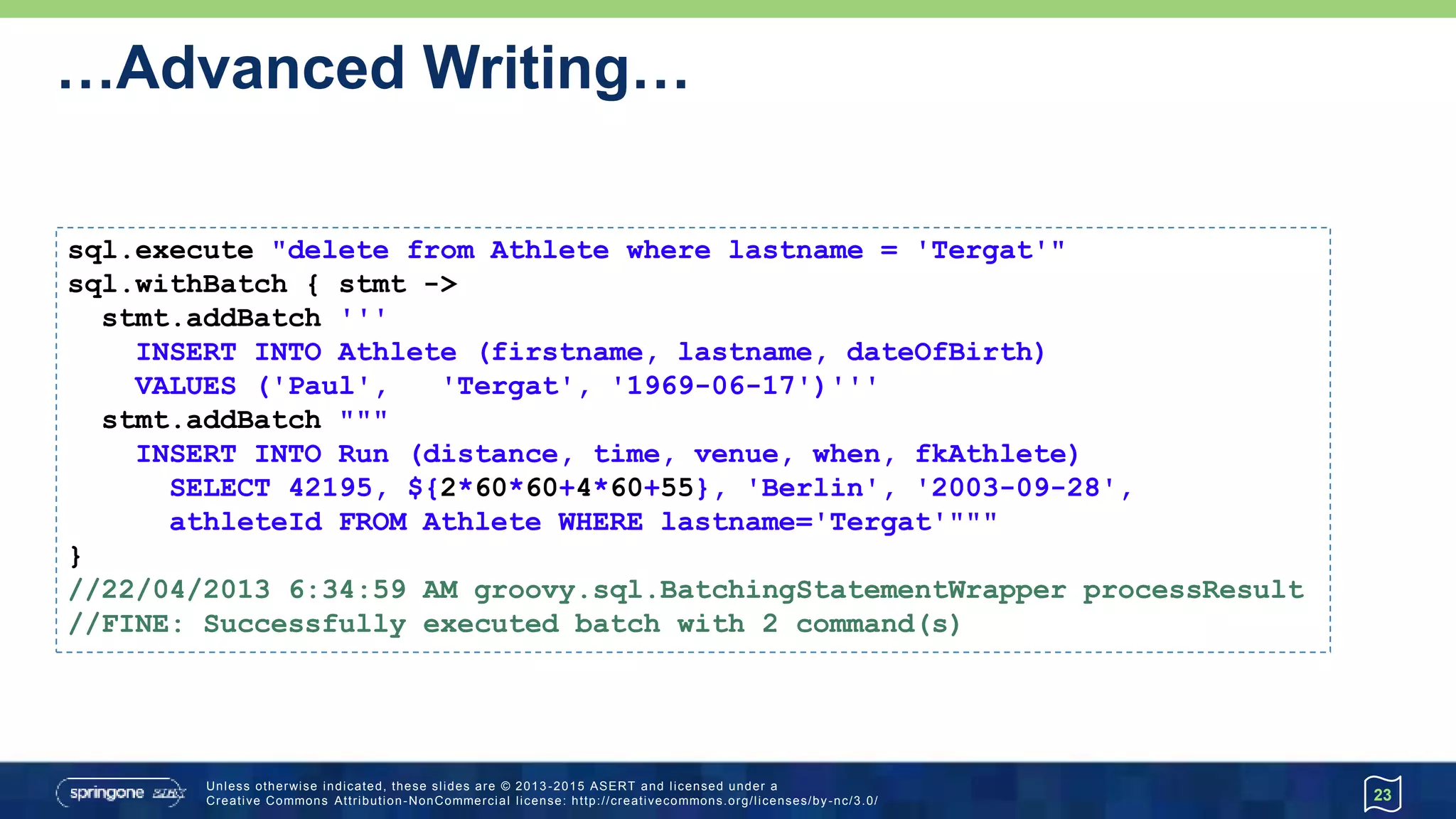
![…Advanced Writing
• Named parameters (two variants) and named-ordinal parameters
24
@Canonical class Athlete { String first, last, dob }
def ndereba = new Athlete('Catherine', 'Ndereba', '1972-07-21')
def takahashi = new Athlete('Naoko', 'Takahashi')
def takahashiExtra = [dob: '1972-05-06']
def loroupe = [first: 'Tegla', last: 'Loroupe', dob: '1973-05-09']
def insertPrefix = 'INSERT INTO Athlete (firstname, lastname, dateOfBirth) VALUES '
sql.execute insertPrefix + ' (?.first,?.last,?.dob)', ndereba
sql.execute insertPrefix + ' (?1.first,?1.last,?2.dob)', takahashi, takahashiExtra
sql.execute insertPrefix + ' (:first,:last,:dob)', loroupe
sql.execute insertPrefix + ' (:first,:last,:dob)', first: 'Ingrid',
last: 'Kristiansen', dob: '1956-03-21'](https://image.slidesharecdn.com/groovydatabasespaulkingsep2014-140909144452-phpapp02/75/groovy-databases-24-2048.jpg)
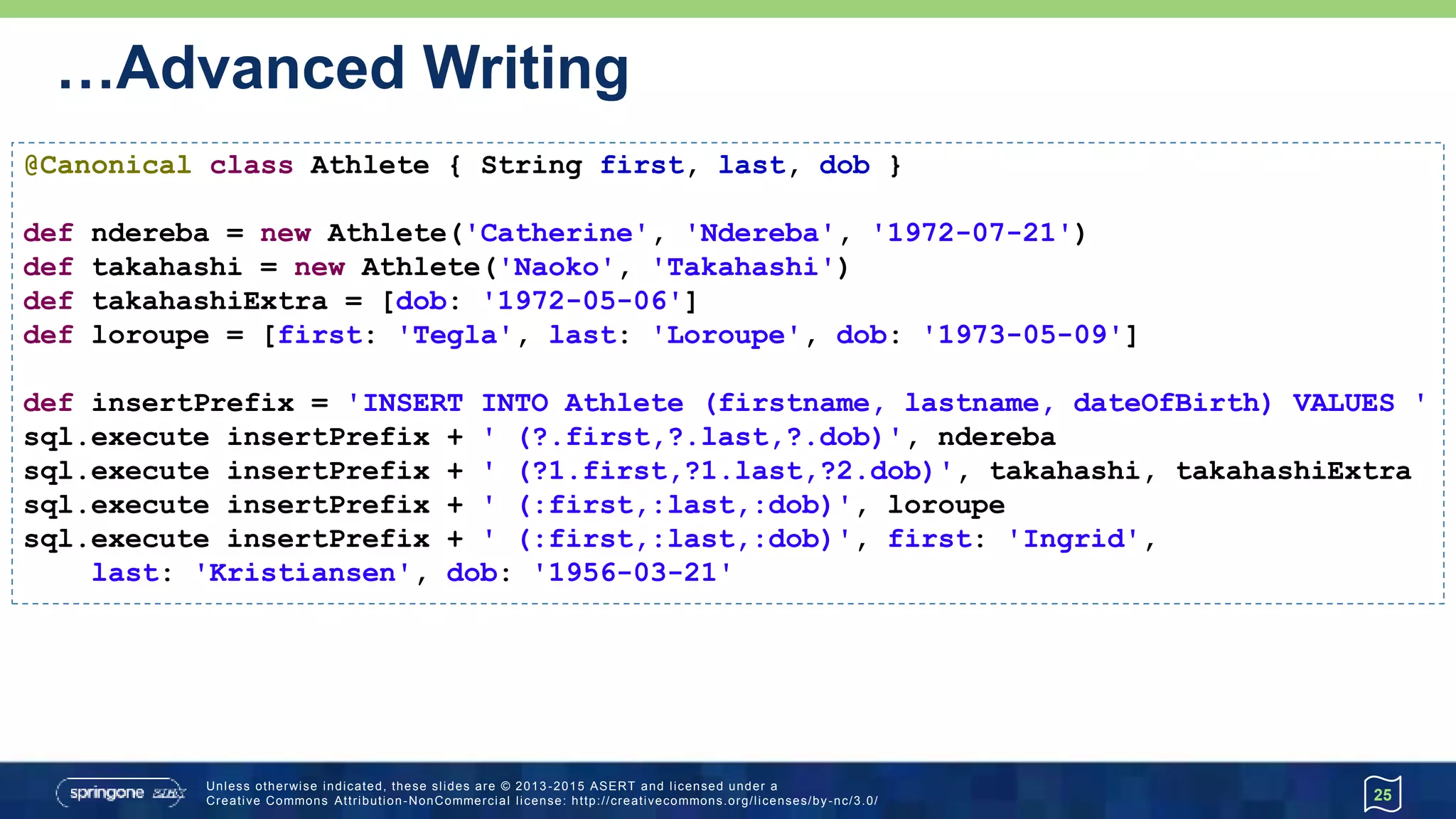
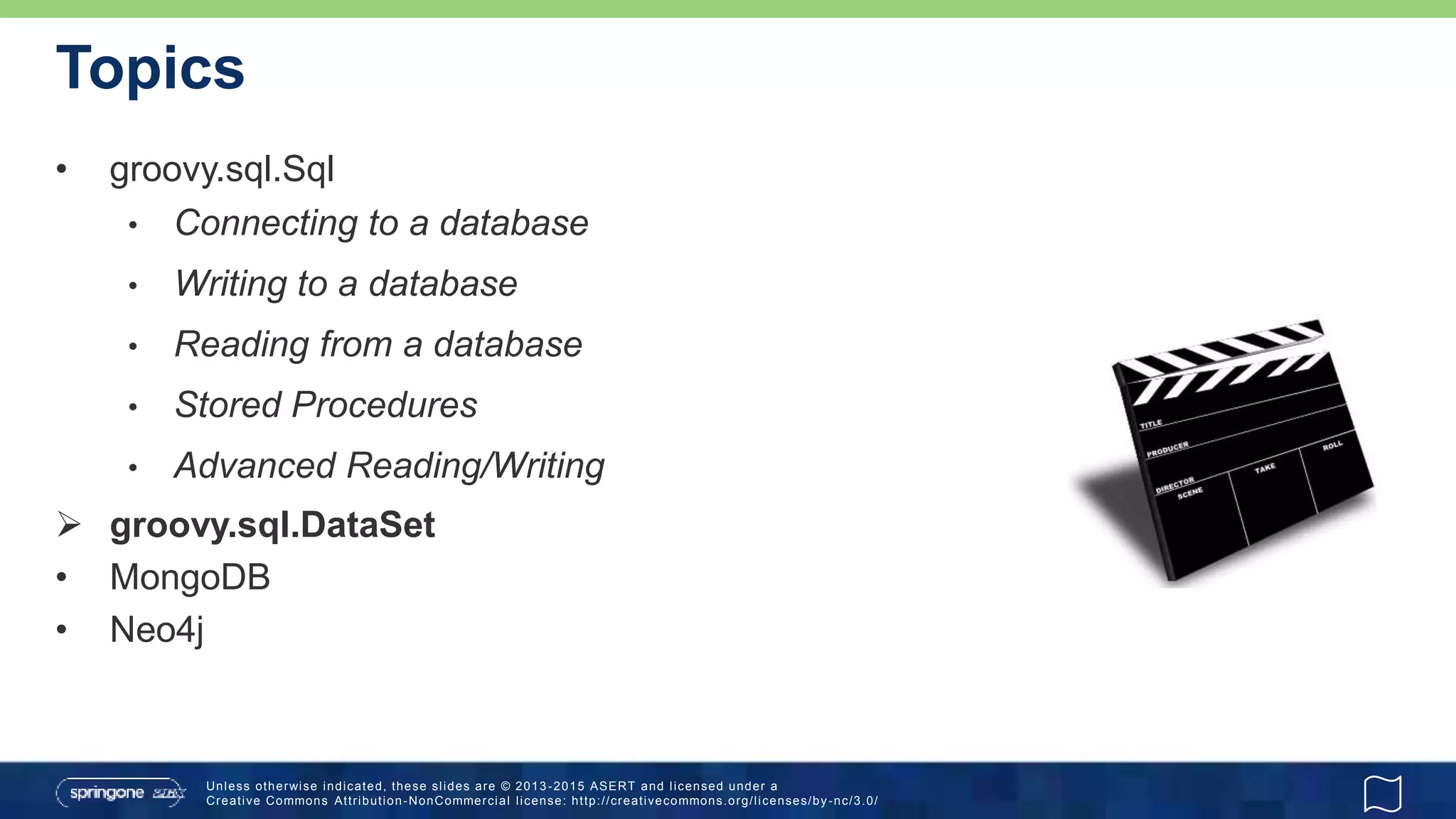
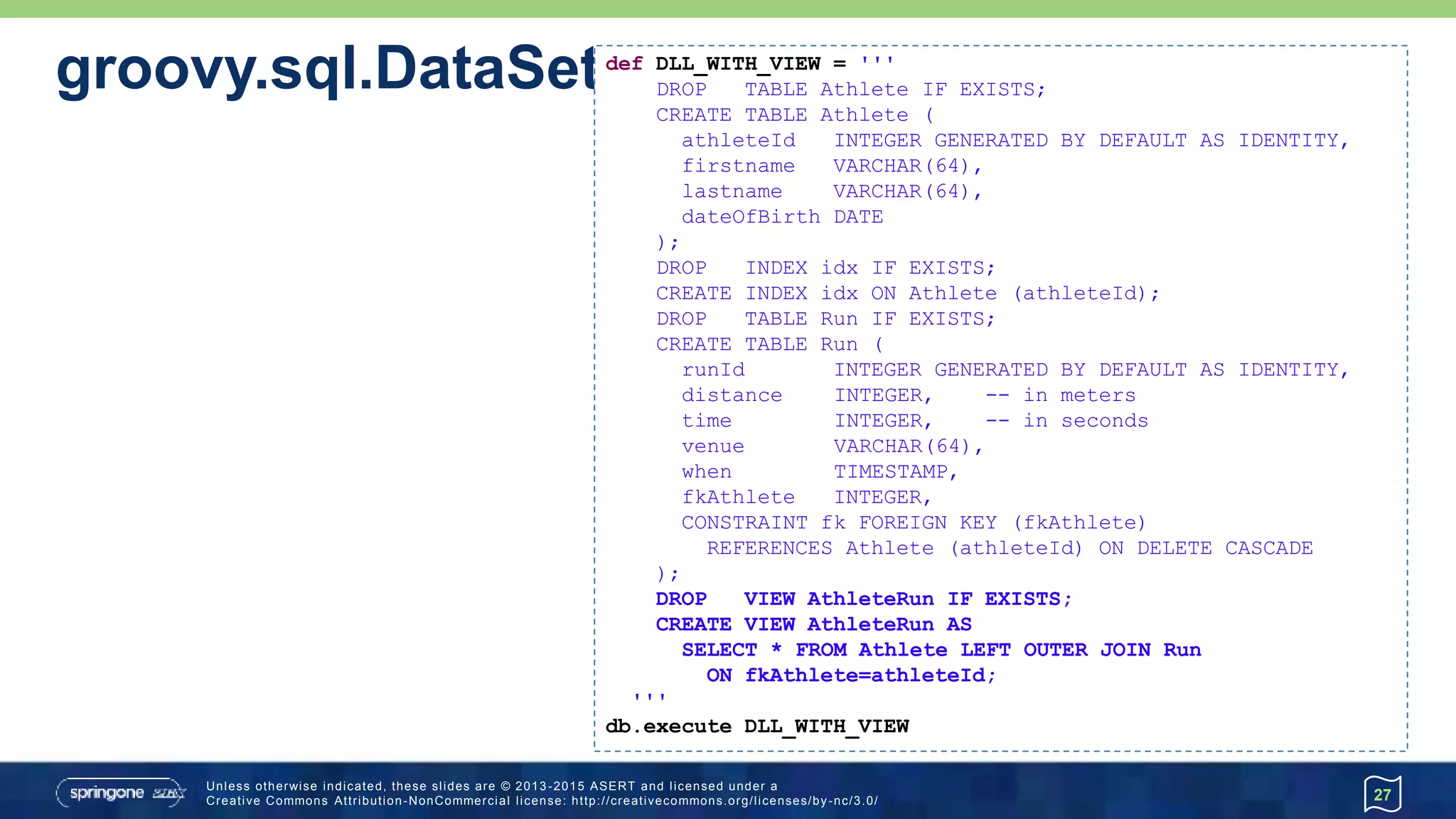
![…DataSet example
28
def query = athletes.findAll { it.firstname >= 'P' }
query = query.findAll { it.dateOfBirth > '1970-01-01' }
query = query.sort { it.dateOfBirth }
query = query.reverse()
println query.sql
println query.parameters
println query.rows()*.firstname // One SQL query here!
select * from Athlete where firstname >= ? and dateOfBirth > ? order by dateOfBirth DESC
[P, 1970-01-01]
[Paula, Ronaldo]](https://image.slidesharecdn.com/groovydatabasespaulkingsep2014-140909144452-phpapp02/75/groovy-databases-28-2048.jpg)
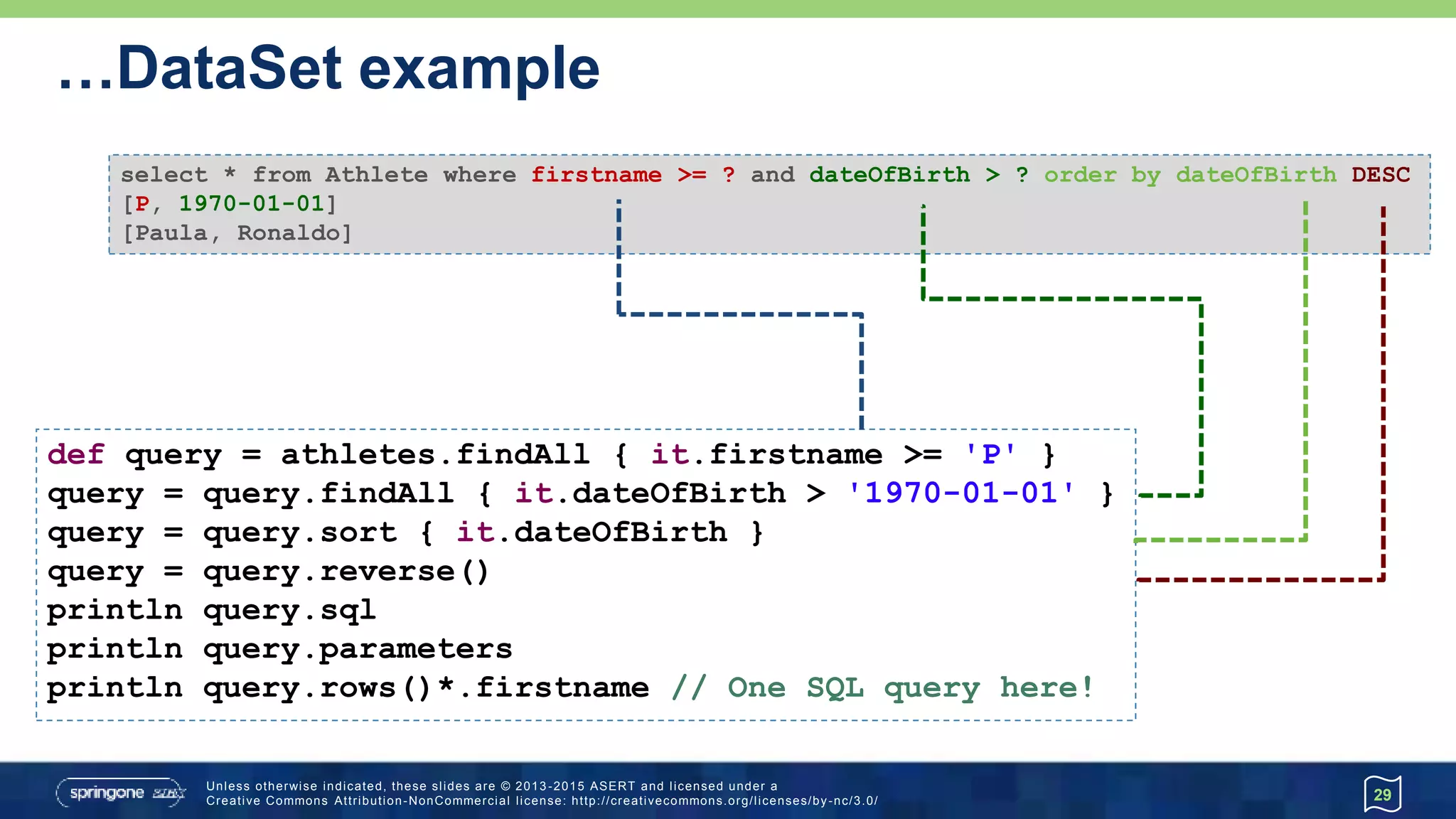
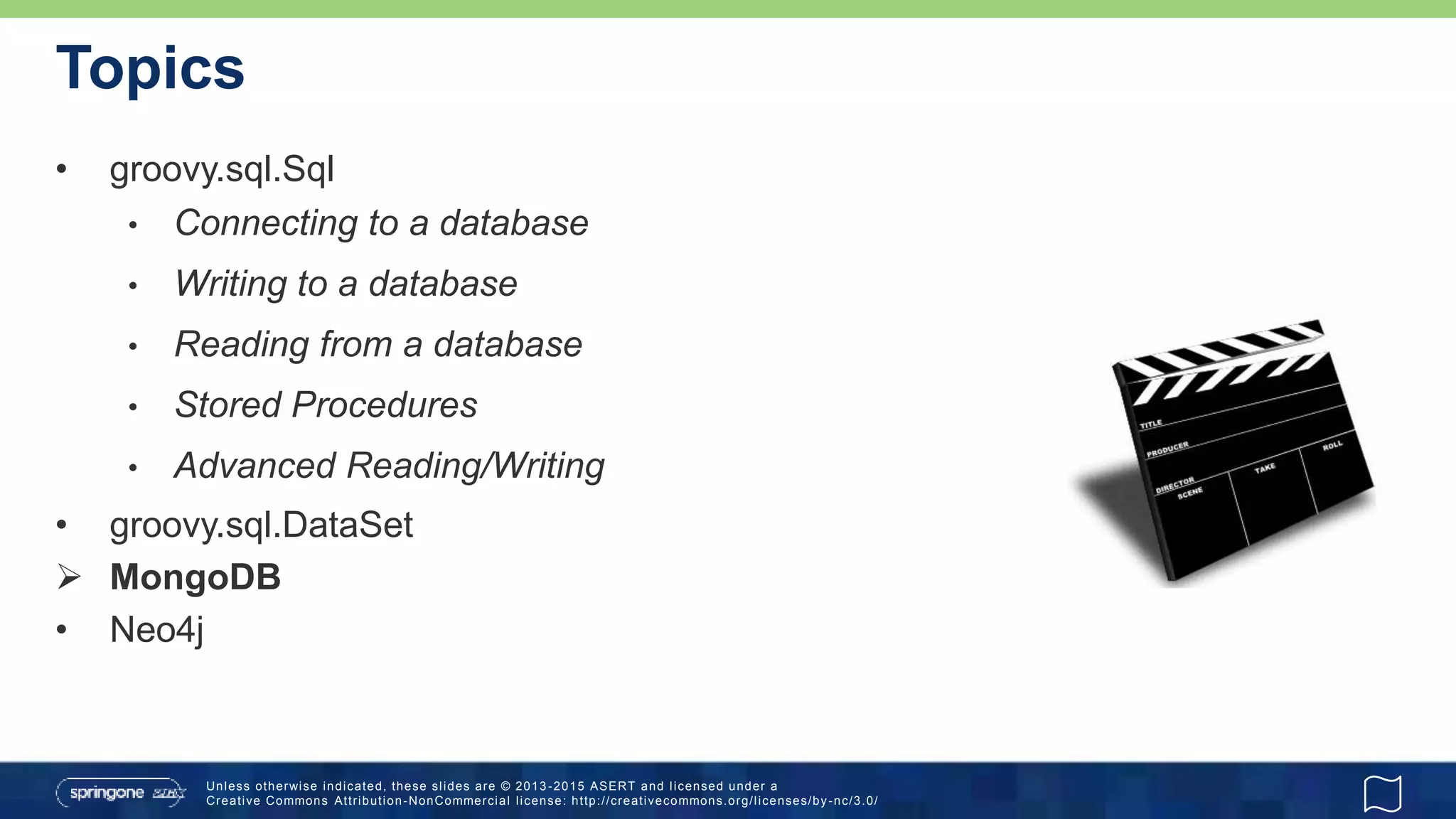
![MongoDB…
31
@Grab('com.gmongo:gmongo:1.3')
import com.gmongo.GMongo
import com.mongodb.util.JSON
import groovy.transform.Field
@Field db = new GMongo().getDB('athletes')
db.athletes.drop()
db.athletes << [first: 'Paul', last: 'Tergat', dob: '1969-06-17', runs: [
[distance: 42195, time: 2 * 60 * 60 + 4 * 60 + 55,
venue: 'Berlin', when: '2003-09-28']
]]
def insertAthlete(first, last, dob) {
db.athletes << [first: first, last: last, dob: dob]
}](https://image.slidesharecdn.com/groovydatabasespaulkingsep2014-140909144452-phpapp02/75/groovy-databases-31-2048.jpg)
![…MongoDB…
32
def insertRun(h, m, s, venue, date, lastname) {
db.athletes.update(
[last: lastname],
[$addToSet: [runs: [distance: 42195,
time: h * 60 * 60 + m * 60 + s,
venue: venue, when: date]]]
)
}
insertAthlete('Khalid', 'Khannouchi', '1971-12-22')
insertAthlete('Ronaldo', 'da Costa', '1970-06-07')
insertRun(2, 5, 38, 'London', '2002-04-14', 'Khannouchi')
insertRun(2, 5, 42, 'Chicago', '1999-10-24', 'Khannouchi')
insertRun(2, 6, 05, 'Berlin', '1998-09-20', 'da Costa')](https://image.slidesharecdn.com/groovydatabasespaulkingsep2014-140909144452-phpapp02/75/groovy-databases-32-2048.jpg)
![…MongoDB…
33
def radcliffe = """{
first: 'Paula',
last: 'Radcliffe',
dob: '1973-12-17',
runs: [
{distance: 42195, time: ${2 * 60 * 60 + 15 * 60 + 25},
venue: 'London', when: '2003-04-13'}
]
}"""
db.athletes << JSON.parse(radcliffe)
assert db.athletes.count == 4
db.athletes.find().each {
println "$it._id $it.last ${it.runs.size()}"
}
516b15fc2b10a15fa09331f2 Tergat 1
516b15fc2b10a15fa09331f3 Khannouchi 2
516b15fc2b10a15fa09331f4 da Costa 1
516b15fc2b10a15fa09331f5 Radcliffe 1](https://image.slidesharecdn.com/groovydatabasespaulkingsep2014-140909144452-phpapp02/75/groovy-databases-33-2048.jpg)
![…MongoDB
34
def londonAthletes = db.athletes.find('runs.venue': 'London')*.first
assert londonAthletes == ['Khalid', 'Paula']
def youngAthletes = db.athletes.aggregate(
[$project: [first: 1, dob: 1]],
[$match: [dob: [$gte: '1970-01-01']]],
[$sort: [dob: -1]]
)
assert youngAthletes.results()*.first == ['Paula', 'Khalid', 'Ronaldo']](https://image.slidesharecdn.com/groovydatabasespaulkingsep2014-140909144452-phpapp02/75/groovy-databases-34-2048.jpg)
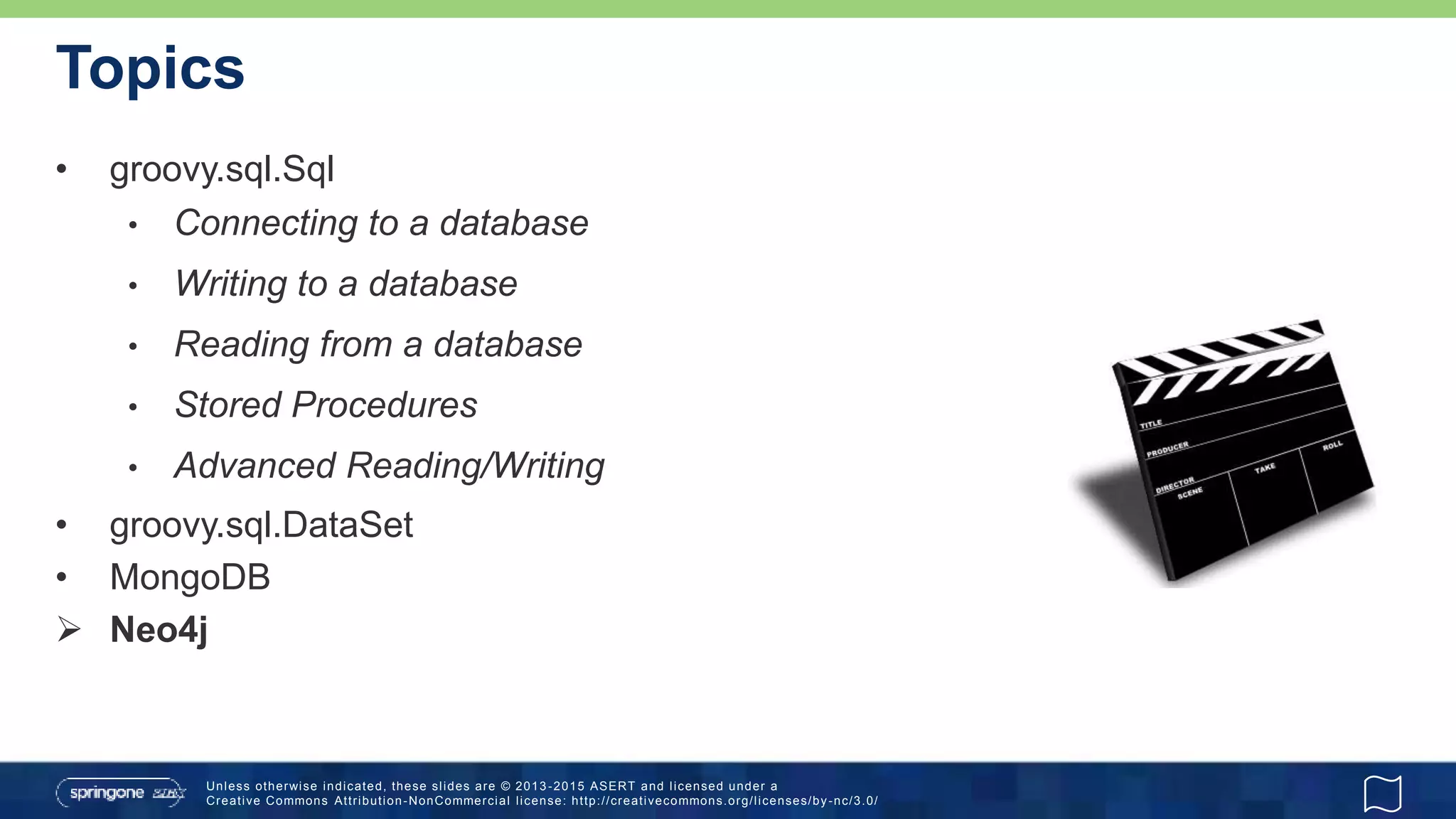
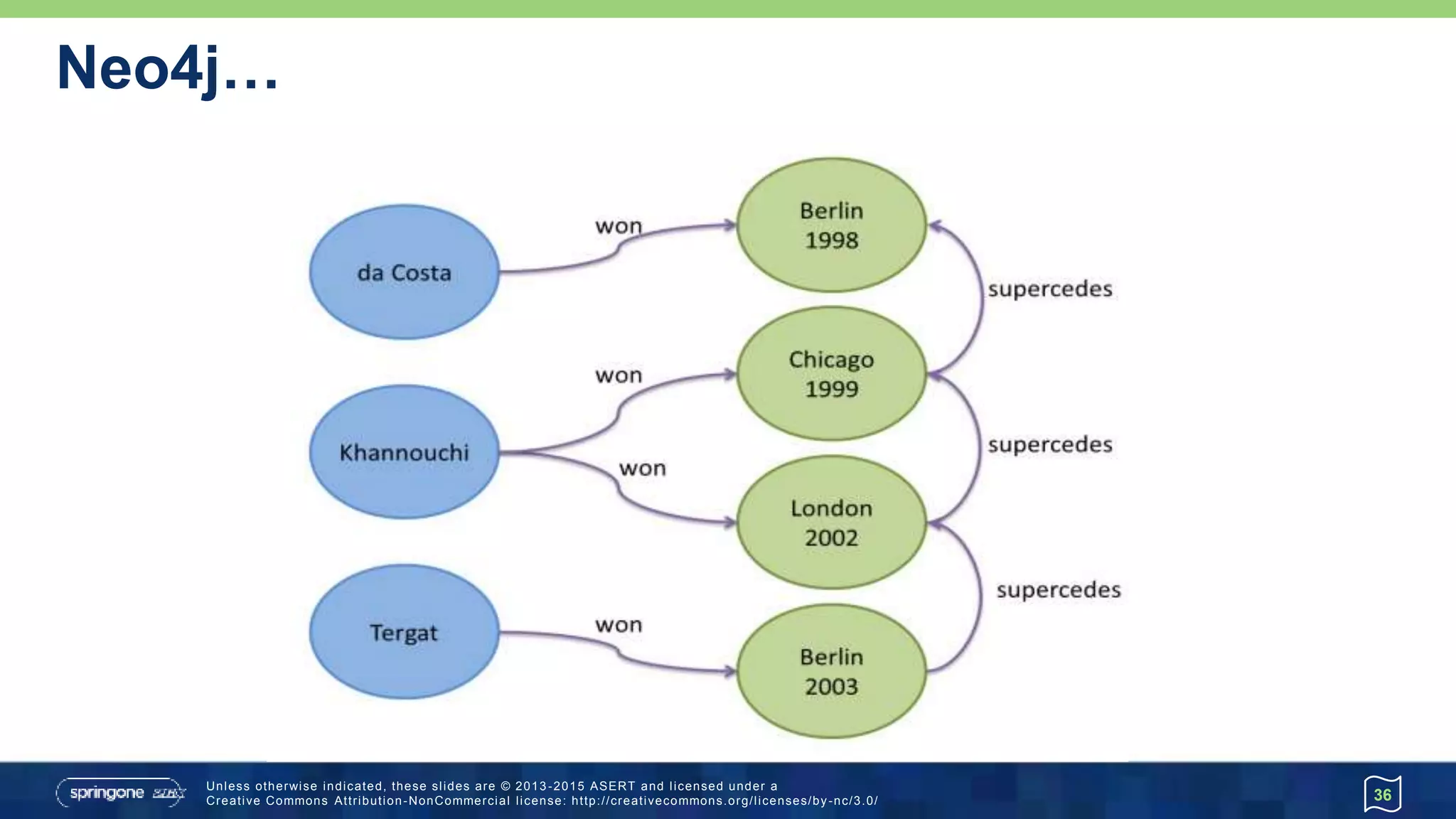
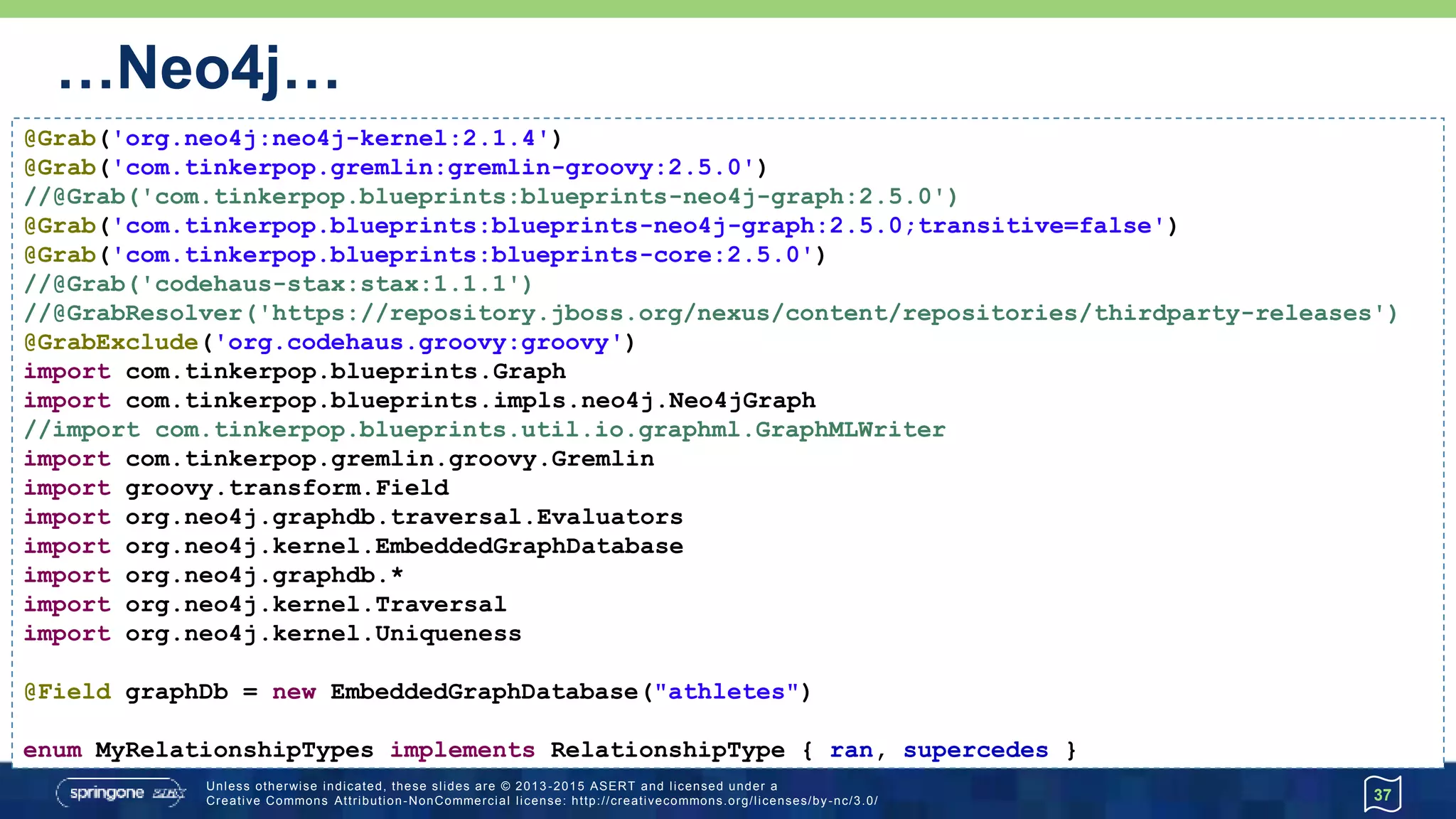
![…Neo4j…
38
// some optional metaclass syntactic sugar
EmbeddedGraphDatabase.metaClass {
createNode { Map properties ->
def n = delegate.createNode()
properties.each { k, v -> n[k] = v }
n
}
}
Node.metaClass {
propertyMissing { String name, val -> delegate.setProperty(name, val) }
propertyMissing { String name -> delegate.getProperty(name) }
methodMissing { String name, args ->
delegate.createRelationshipTo(args[0], MyRelationshipTypes."$name")
}
}
Relationship.metaClass {
propertyMissing { String name, val -> delegate.setProperty(name, val) }
propertyMissing { String name -> delegate.getProperty(name) }
}](https://image.slidesharecdn.com/groovydatabasespaulkingsep2014-140909144452-phpapp02/75/groovy-databases-38-2048.jpg)
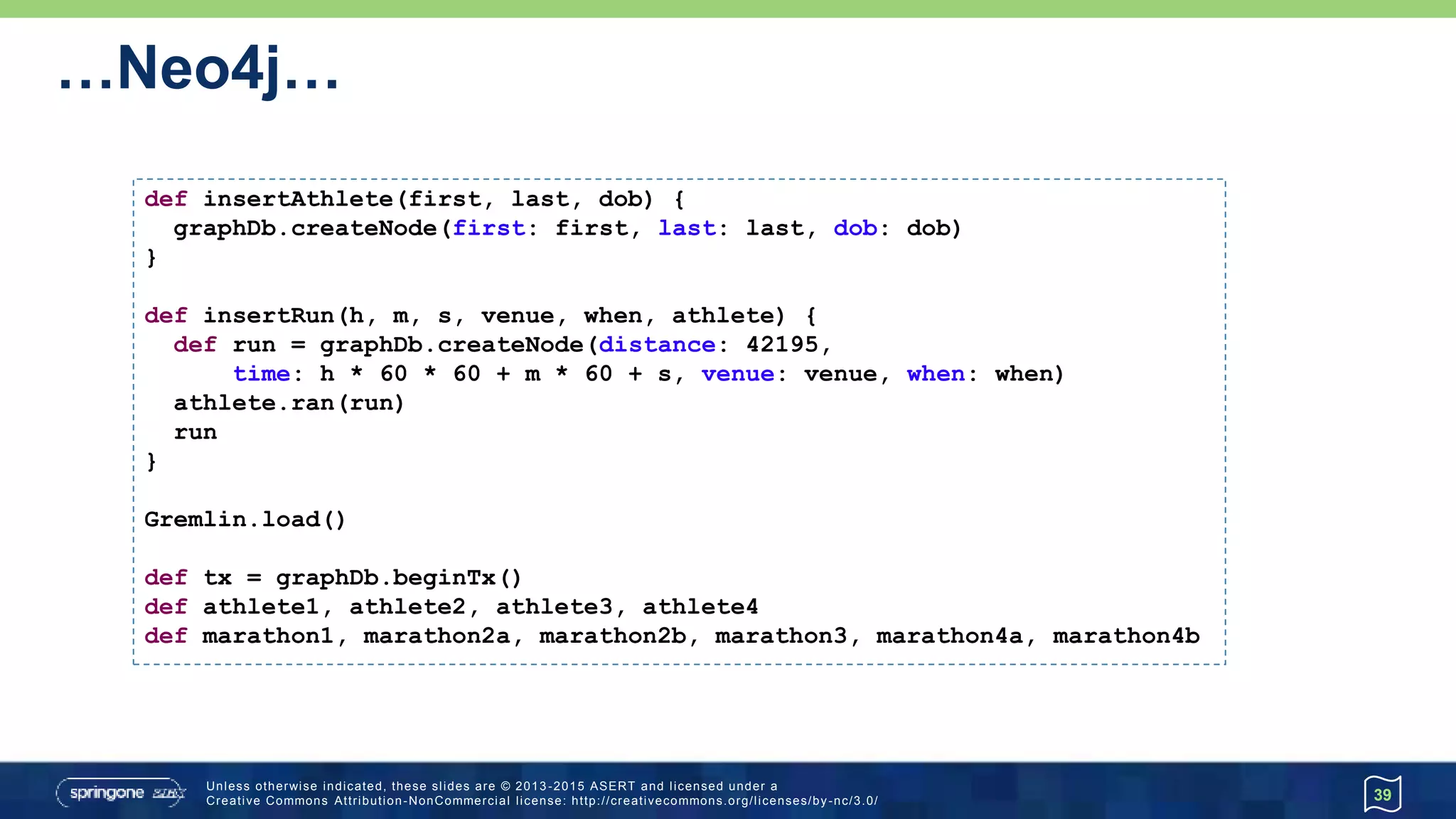
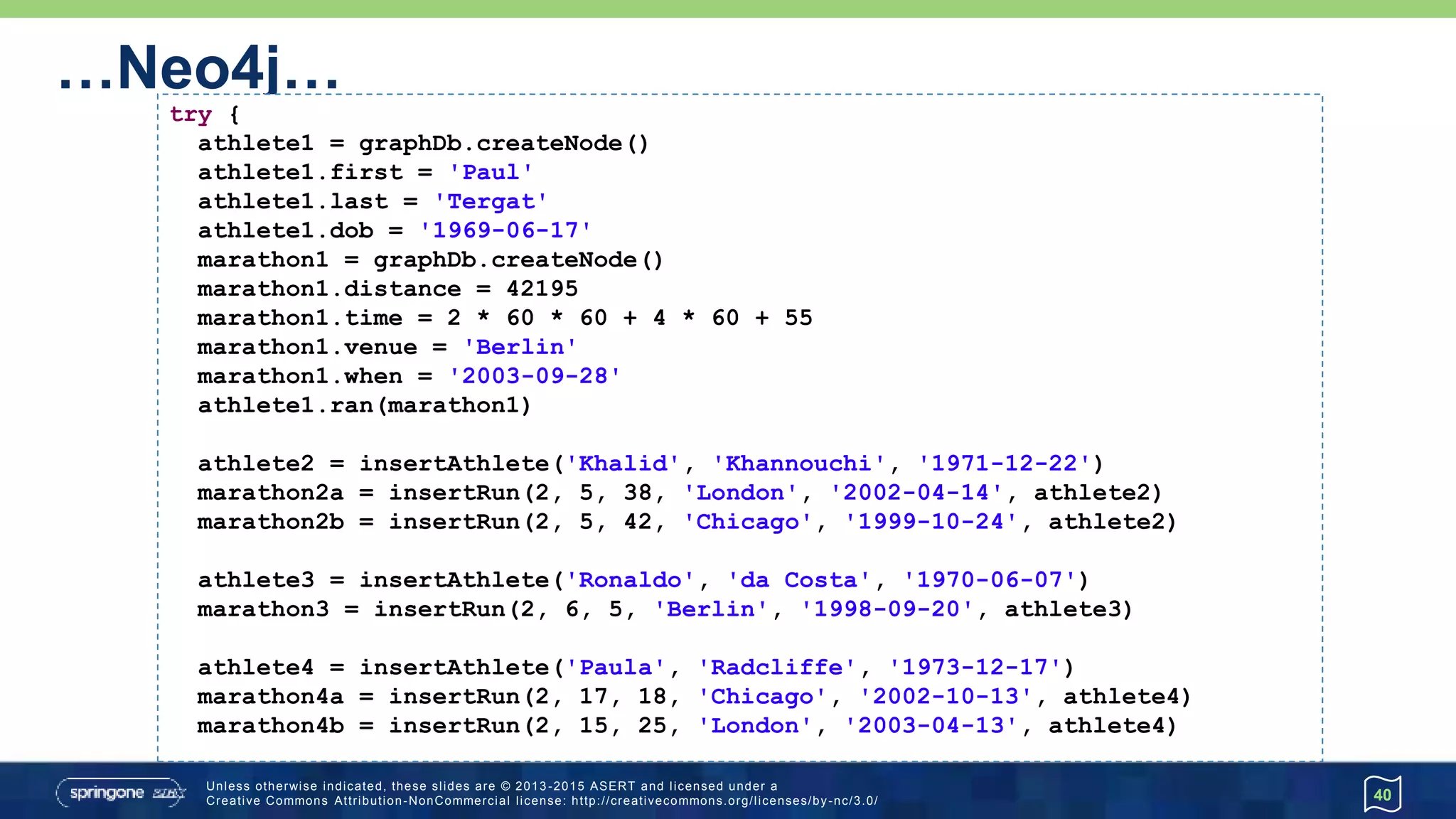
![…Neo4j…
41
def venue = marathon1.venue
def when = marathon1.when
println "$athlete1.first $athlete1.last won the $venue marathon on $when"
def allAthletes = [athlete1, athlete2, athlete3, athlete4]
def wonInLondon = allAthletes.findAll { athlete ->
athlete.getRelationships(MyRelationshipTypes.won).any { record ->
record.getOtherNode(athlete).venue == 'London'
}
}
assert wonInLondon*.last == ['Khannouchi', 'Radcliffe']
marathon2b.supercedes(marathon3)
marathon2a.supercedes(marathon2b)
marathon1.supercedes(marathon2a)
marathon4b.supercedes(marathon4a)](https://image.slidesharecdn.com/groovydatabasespaulkingsep2014-140909144452-phpapp02/75/groovy-databases-41-2048.jpg)
![…Neo4j…
42
println "World records following $marathon3.venue $marathon3.when:"
def t = new Traversal()
for (Path p in t.description().breadthFirst().
relationships(MyRelationshipTypes.supercedes).
evaluator(Evaluators.fromDepth(1)).
uniqueness(Uniqueness.NONE).
traverse(marathon3)) {
def newRecord = p.endNode()
println "$newRecord.venue $newRecord.when"
}
Graph g = new Neo4jGraph(graphDb)
def pretty = { it.collect { "$it.venue $it.when" }.join(', ') }
def results = []
g.V('venue', 'London').fill(results)
println 'London world records: ' + pretty(results)
results = []
g.V('venue', 'London').in('supercedes').fill(results)
println 'World records after London: ' + pretty(results)](https://image.slidesharecdn.com/groovydatabasespaulkingsep2014-140909144452-phpapp02/75/groovy-databases-42-2048.jpg)
![…Neo4j
43
results = []
def emitAll = { true }
def forever = { true }
def berlin98 = { it.venue == 'Berlin' && it.when.startsWith('1998') }
g.V.filter(berlin98).in('supercedes').loop(1, forever, emitAll).fill(results)
println 'World records after Berlin 1998: ' + pretty(results)
// def writer = new GraphMLWriter(g)
// def out = new FileOutputStream("c:/temp/athletes.graphml")
// writer.outputGraph(out)
// writer.setNormalize(true)
// out.close()
tx.success()
} finally {
tx.finish()
graphDb.shutdown()
}](https://image.slidesharecdn.com/groovydatabasespaulkingsep2014-140909144452-phpapp02/75/groovy-databases-43-2048.jpg)
